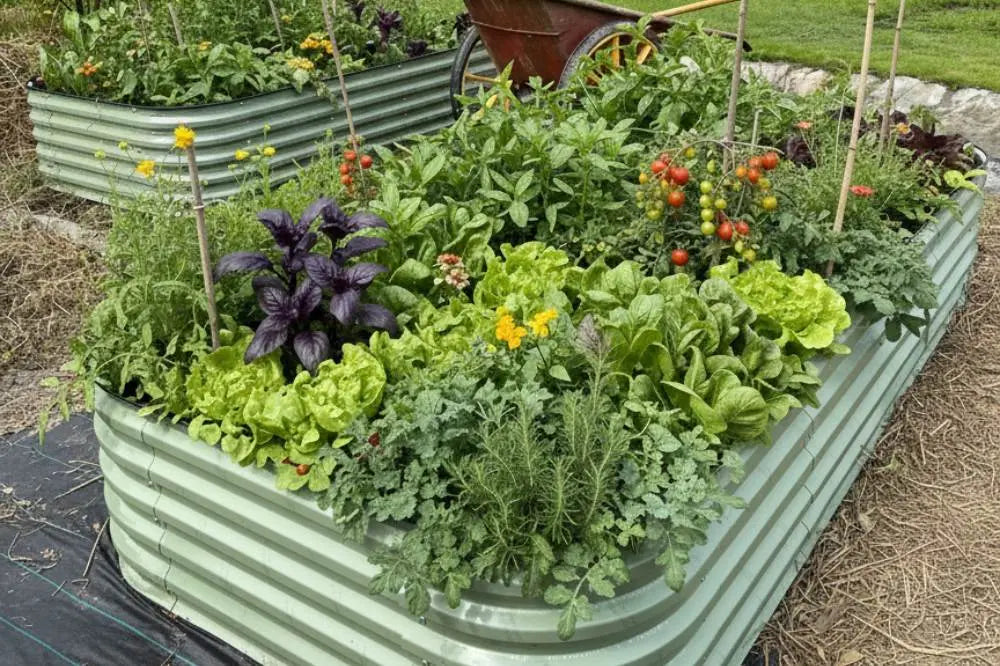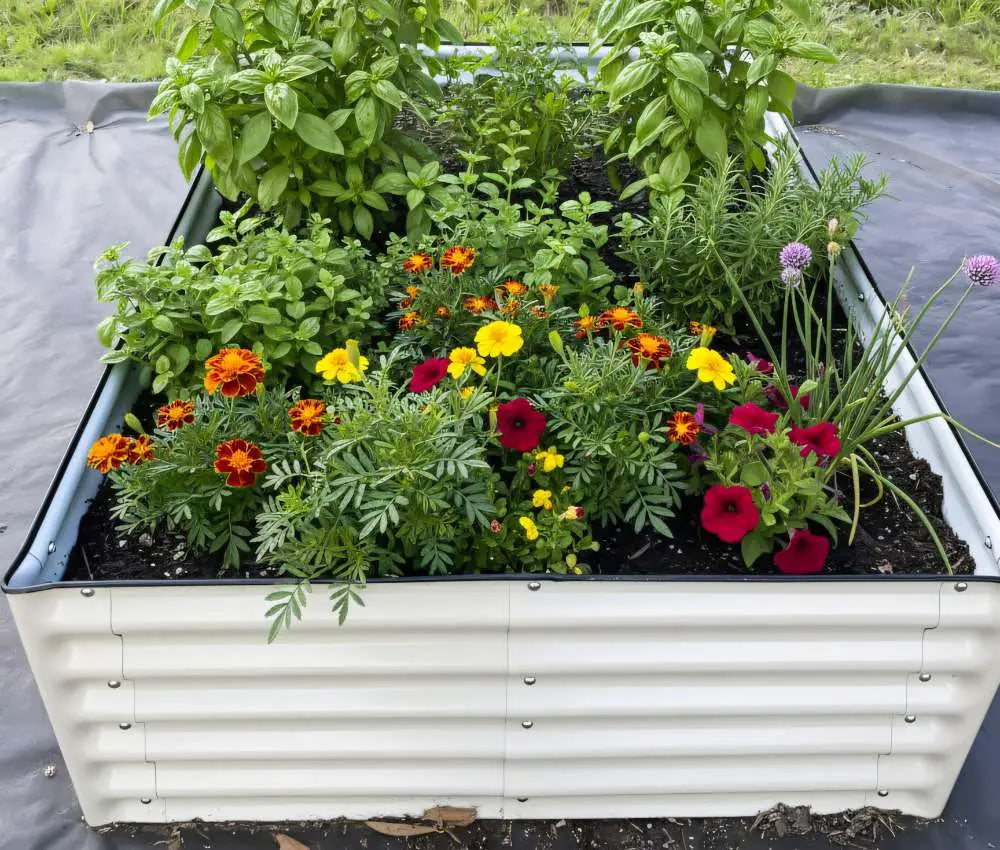What to Put in a Metal Raised Garden Bed
By King Conrad Fanoga
Author bio: King Conrad Fanoga is a passionate contributing writer and SEO specialist with a flair for creating captivating content. When he's not crafting articles, you can find him nurturing his mini garden at home, cultivating a green oasis of tranquillity.
Are you considering a metal raised garden bed?
Well, you've made an excellent choice!
Raised garden beds offer numerous advantages over traditional ground-level gardens and are essential for providing optimal growing conditions. Elevating the soil level offers you better drainage and enhanced soil quality. Metal raised garden beds are also durable and visually appealing, making them perfect for garden enthusiasts like yourself.
This article will explore the ten essential components you should include in your metal raised garden bed to ensure successful gardening outcomes.
Quality Soil

Soil is the foundation of your flourishing garden. With metal raised garden beds, you have better control over soil quality, ensuring optimal conditions for your plants to thrive. You can create customized soil mixes rich in organic matter, promoting healthy root development and nutrient absorption.
Choose a well-draining mix when selecting soil for your metal raised garden bed. Combine loamy soil, compost, and organic matter like aged manure or peat moss to balance nutrients and moisture retention perfectly.
Drainage System
Proper drainage is crucial for healthy plant growth as it prevents waterlogged soil, which can lead to root rot and other issues. Ensure your metal raised garden bed has a reliable drainage system to remove excess water efficiently.
To facilitate drainage, start by lining the bottom of your metal raised garden bed with a layer of gravel or small rocks. This layer allows water to pass through freely, preventing water buildup. Moreover, consider creating small drainage holes in the sides of the bed or adding a perforated pipe to improve drainage further.
Weed Barrier
Weeds can quickly overrun your garden, stealing vital nutrients and resources from your desired plants. Preventing weed growth is crucial for maintaining a healthy and productive garden.
To create an effective weed barrier, lay a porous landscape fabric or cardboard at the bottom of your raised bed before filling it with soil. This barrier prevents weed seeds from germinating while allowing water and nutrients to pass through. It would help if you also made it a habit to regularly hand weed and apply mulch to minimize weed growth further. Also read: 5 All-Natural Ways to Keep Your Garden Bed Weed-Free.
Compost and Organic Matter
Compost and organic matter are vital in enriching the soil and providing essential nutrients to your plants. Incorporating these elements into your metal raised garden bed significantly enhances soil fertility.
Regularly adding compost to your raised bed replenishes nutrients, improve soil structure, and promotes beneficial microbial activity. Incorporate organic matter, such as composted leaves or kitchen scraps, into your bed to enhance nutrient content and water retention.
Mulch

Mulch is a protective layer, reducing water evaporation and preventing soil erosion. It also inhibits weed growth by blocking sunlight and providing insulation during temperature fluctuations.
When selecting mulch for your metal garden bed, consider options such as straw, wood chips, or shredded bark. These materials are readily available, cost-effective, and offer excellent moisture retention properties.
Plant Support Structures
Supporting tall or vining plants is essential to prevent them from sprawling and to ensure optimal growth. Install trellises or cages in your metal raised garden bed to provide support and maximize space.
When setting up plant support structures, consider the specific needs of your plants. Attach trellises to the sides or back of your raised bed for climbing plants like tomatoes or cucumbers. For plants that require more substantial support, insert sturdy cages or stakes directly into the soil.
Irrigation System
Proper watering is essential for the productivity and health of your plants. By installing an efficient irrigation system in your metal raised garden bed, you can ensure a consistent water supply and reduce the risk of over or under-watering.
Drip irrigation or soaker hoses are best for metal raised garden beds as they deliver water straight to the plant roots, minimizing water waste and reducing the risk of fungal diseases. Consider using timers to automate watering schedules, ensuring your plants receive adequate moisture.
Pest Control Measures
Your plants can suffer significantly from garden pests, causing stunted growth and lower crop yields. Implementing pest control methods is crucial to protect the health and productivity of your metal raised garden bed.
Natural pest control techniques, like companion planting, insect-repelling plants, and organic pest deterrents like neem oil or diatomaceous earth, are ideal for maintaining a healthy garden ecosystem.
You can install a camera to remotely monitor your garden and practice early detection to prevent infestations and minimize damage. Using a video editor and recorder, you can document pest-related issues for further analysis and intervention.
Season Extenders

Prolonging the growing season allows you to enjoy fresh produce for extended periods. Season extenders help protect your plants from adverse weather conditions and provide optimal growing conditions.
You can use cold frames, row covers, or cloches to shield your plants from frost, wind, or excessive heat. These structures create a microclimate that promotes plant growth and extends the growing season.
Monitoring Tools
Regularly monitoring your garden conditions is vital for identifying issues and making timely adjustments. Monitoring tools enable you to assess soil moisture levels, temperature, and sunlight exposure, allowing for informed decision-making and proactive adjustments to optimize plant growth.
Moisture meters, digital thermometers, and light meters are essential for monitoring soil moisture, temperature, and light levels. These tools provide accurate readings, ensuring optimal growing conditions for your plants.
Conclusion
Incorporating these ten elements into your gardening practices is essential to ensure a successful metal garden bed.
- preventing weed growth
- enhancing fertility with compost
- using appropriate mulch
- providing plant support structures
- establishing efficient irrigation
- managing pests
- utilizing season extenders
- monitoring garden condition
Implement these tips, and get ready to reap the rewards of a bountiful and thriving garden in your metal raised bed. Happy gardening!


